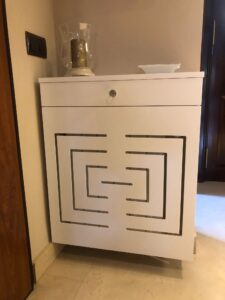4. "I'm hot, people laugh"
Should we raise and lower the temperature constantly? What about the way we dress at home? What is the most correct? Much has been said about the exact degrees to which you should regulate your heating and to be consistent with the season of the year in which we live. This is totally true, it doesn't make sense that it's bitterly cold outside and that you're like a Caribbean person at home. A temperature of between 21 and 22ºC in winter is sufficient, although you will probably need long sleeves.
5. The material from which the radiator is made has no influence
Beep! Wrong again! As our experts in the field informed us, finned radiators, such as aluminum or convector-style radiators, should be avoided because they give off heat through hot air. The less air and the more radiant surface (like the sun), the better the quality of heat.
6. Heat does not escape through the windows
If this doubt bothers you as much as it does us, pay attention to the words of Mr. José Enrique Ferlosio: «Where the heat escapes the most is through the windows. The best Passivhaus certified window loses even more than the wall. The second place where the most heat is lost are leaks: every time we open a window, through the grilles, between the window and the frame, through the gap in the blind...». If you think the time has come to change your windows here we leave you valuable information.
7. Blue heat is better than a heat pump
When blue heat appeared on the market, it promised to be a more economical and environmentally friendly option. However, everything remained in promises because in the end it has been shown that it is not a good option. It works just like an oil radiator but heating other fluids. Anything that works with resistors will always be more expensive and ineffective. If we talk about electric heat, the best is a split with inverter technology.
8. Thermostats are a must
“Forget the thermostat, you don't have to pay attention to the temperature. Commercial thermostats have a fairly large degree of error. If we do a test in a room with two different thermostats, there may be a 3 degree difference between one and the other. We have to reach the temperature that makes us feel good. In fact, in Switzerland and Germany, by law, the thermostatic heads do not mark temperatures but positions: 1, 2, 3...”, José Enrique Ferlosio explains.
 9. Radiator covers yes or no?
To our joy (although we already knew it), it turns out that the radiator covers do not affect the heat output at all. They favor the flow of heat and facilitate the passage of hot air. "A decorative radiator cover costs much less than a new radiator, so covering it is a great idea." José Enrique Ferlosio Díaz, general director of Indoor Climate, advises us.
During the winter we all struggle to keep our houses warm, trying not to leave our salary on the heating bill. We read on the internet, we let ourselves be advised by “experts” in the matter of the type: your father-in-law or the neighbor of the fifth, and we play to raise, lower or turn off the heating to the tun tun.
Prepare your house for winter
We have consulted with real experts when it comes to heating and they have given us their point of view. Beyond degrees, there is thermal comfort, and that will also depend on the type of activity you have at home: «The temperature we need when we are active at home is different than when we are at rest or in bed. Cooking is not the same as reading on the sofa or sleeping. The ideal would be to have a chrono-thermostat, which regulates according to the time it is, to regulate according to the time.»
What you have to know
You have to regulate the temperature and lower it at night or when you are not there, but it is not convenient to turn it off.
Take good care of leaks that can occur through the windows. Make sure they close well and invest in a good insulation system.
The size of the radiator does matter. The larger, the heat is distributed better.
Better to invest in a radiator cover than to change the radiator. The cost is much lower and it will improve the aesthetics of your space.
Now you know how to keep your house at the right temperature without being fooled by winter myths and legends.
9. Radiator covers yes or no?
To our joy (although we already knew it), it turns out that the radiator covers do not affect the heat output at all. They favor the flow of heat and facilitate the passage of hot air. "A decorative radiator cover costs much less than a new radiator, so covering it is a great idea." José Enrique Ferlosio Díaz, general director of Indoor Climate, advises us.
During the winter we all struggle to keep our houses warm, trying not to leave our salary on the heating bill. We read on the internet, we let ourselves be advised by “experts” in the matter of the type: your father-in-law or the neighbor of the fifth, and we play to raise, lower or turn off the heating to the tun tun.
Prepare your house for winter
We have consulted with real experts when it comes to heating and they have given us their point of view. Beyond degrees, there is thermal comfort, and that will also depend on the type of activity you have at home: «The temperature we need when we are active at home is different than when we are at rest or in bed. Cooking is not the same as reading on the sofa or sleeping. The ideal would be to have a chrono-thermostat, which regulates according to the time it is, to regulate according to the time.»
What you have to know
You have to regulate the temperature and lower it at night or when you are not there, but it is not convenient to turn it off.
Take good care of leaks that can occur through the windows. Make sure they close well and invest in a good insulation system.
The size of the radiator does matter. The larger, the heat is distributed better.
Better to invest in a radiator cover than to change the radiator. The cost is much lower and it will improve the aesthetics of your space.
Now you know how to keep your house at the right temperature without being fooled by winter myths and legends.
 At Emoble we are aware that there are a large number of myths about the home use of heating, in the daily dealings with our clients, we are used to being asked many questions about it, not only about radiator covers, but also about heating usually. That is why in this article we address the 10 most recurrent myths and realities about heating in homes.
1. If I turn off the heating, I will save
This is one of the main urban legends that run through the streets during the winter and that nobody knows for sure if it is true or not. We have asked a true expert when it comes to heating, José Enrique Ferlosio Díaz, CEO of the company Indoor Climate, and this is what he told us: “The heating has to be on all the time; what consumes the most is turning the heating off and on again. Unless a person lives alone and leaves home in the morning. Turning it off is not synonymous with saving.” According to data from the OCU, it is recommended to lower it to 16ºC at night, or when you are not at home. This will mean a saving of 13%. Of course, this statement contradicts the latest statements by the Ministry of Ecological Transition as far as the sustainability of the increase in consumption is concerned.
2. The size of the radiator does not matter
Yes, size does matter. «The radiator, with equal power, the bigger it is, the better, because it gives off heat more smoothly. If you have a very concentrated heat point, you are generating excess heat near that point and lack of heat away from it. The larger the radiator, the less concentrated the heat, the more uniform it is.” They tell us from the company Indoor Climate.
3. Vertical radiators are merely decorative
At Emoble we are aware that there are a large number of myths about the home use of heating, in the daily dealings with our clients, we are used to being asked many questions about it, not only about radiator covers, but also about heating usually. That is why in this article we address the 10 most recurrent myths and realities about heating in homes.
1. If I turn off the heating, I will save
This is one of the main urban legends that run through the streets during the winter and that nobody knows for sure if it is true or not. We have asked a true expert when it comes to heating, José Enrique Ferlosio Díaz, CEO of the company Indoor Climate, and this is what he told us: “The heating has to be on all the time; what consumes the most is turning the heating off and on again. Unless a person lives alone and leaves home in the morning. Turning it off is not synonymous with saving.” According to data from the OCU, it is recommended to lower it to 16ºC at night, or when you are not at home. This will mean a saving of 13%. Of course, this statement contradicts the latest statements by the Ministry of Ecological Transition as far as the sustainability of the increase in consumption is concerned.
2. The size of the radiator does not matter
Yes, size does matter. «The radiator, with equal power, the bigger it is, the better, because it gives off heat more smoothly. If you have a very concentrated heat point, you are generating excess heat near that point and lack of heat away from it. The larger the radiator, the less concentrated the heat, the more uniform it is.” They tell us from the company Indoor Climate.
3. Vertical radiators are merely decorative
 We are used to horizontal radiators and to make them as small as possible. Given this, José Enrique Ferlosio has something to say: «Long radiators are advisable, either horizontally or vertically. In the case of the horizontal ones, these should occupy the width of the window. Do not get carried away by the height of the traditional radiator. The verticals must reach the ceiling or the lintel of the door. The most advisable are the vertical ones because it is the upper part that radiates to the entire room.»
We are used to horizontal radiators and to make them as small as possible. Given this, José Enrique Ferlosio has something to say: «Long radiators are advisable, either horizontally or vertically. In the case of the horizontal ones, these should occupy the width of the window. Do not get carried away by the height of the traditional radiator. The verticals must reach the ceiling or the lintel of the door. The most advisable are the vertical ones because it is the upper part that radiates to the entire room.»
 9. Radiator covers yes or no?
To our joy (although we already knew it), it turns out that the radiator covers do not affect the heat output at all. They favor the flow of heat and facilitate the passage of hot air. "A decorative radiator cover costs much less than a new radiator, so covering it is a great idea." José Enrique Ferlosio Díaz, general director of Indoor Climate, advises us.
During the winter we all struggle to keep our houses warm, trying not to leave our salary on the heating bill. We read on the internet, we let ourselves be advised by “experts” in the matter of the type: your father-in-law or the neighbor of the fifth, and we play to raise, lower or turn off the heating to the tun tun.
Prepare your house for winter
We have consulted with real experts when it comes to heating and they have given us their point of view. Beyond degrees, there is thermal comfort, and that will also depend on the type of activity you have at home: «The temperature we need when we are active at home is different than when we are at rest or in bed. Cooking is not the same as reading on the sofa or sleeping. The ideal would be to have a chrono-thermostat, which regulates according to the time it is, to regulate according to the time.»
What you have to know
You have to regulate the temperature and lower it at night or when you are not there, but it is not convenient to turn it off.
Take good care of leaks that can occur through the windows. Make sure they close well and invest in a good insulation system.
The size of the radiator does matter. The larger, the heat is distributed better.
Better to invest in a radiator cover than to change the radiator. The cost is much lower and it will improve the aesthetics of your space.
Now you know how to keep your house at the right temperature without being fooled by winter myths and legends.
9. Radiator covers yes or no?
To our joy (although we already knew it), it turns out that the radiator covers do not affect the heat output at all. They favor the flow of heat and facilitate the passage of hot air. "A decorative radiator cover costs much less than a new radiator, so covering it is a great idea." José Enrique Ferlosio Díaz, general director of Indoor Climate, advises us.
During the winter we all struggle to keep our houses warm, trying not to leave our salary on the heating bill. We read on the internet, we let ourselves be advised by “experts” in the matter of the type: your father-in-law or the neighbor of the fifth, and we play to raise, lower or turn off the heating to the tun tun.
Prepare your house for winter
We have consulted with real experts when it comes to heating and they have given us their point of view. Beyond degrees, there is thermal comfort, and that will also depend on the type of activity you have at home: «The temperature we need when we are active at home is different than when we are at rest or in bed. Cooking is not the same as reading on the sofa or sleeping. The ideal would be to have a chrono-thermostat, which regulates according to the time it is, to regulate according to the time.»
What you have to know
You have to regulate the temperature and lower it at night or when you are not there, but it is not convenient to turn it off.
Take good care of leaks that can occur through the windows. Make sure they close well and invest in a good insulation system.
The size of the radiator does matter. The larger, the heat is distributed better.
Better to invest in a radiator cover than to change the radiator. The cost is much lower and it will improve the aesthetics of your space.
Now you know how to keep your house at the right temperature without being fooled by winter myths and legends.